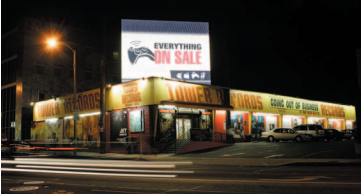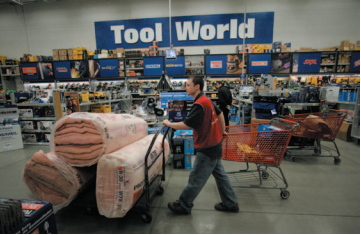
The Times They Are A-Changing
American.gov | 2013-01-24 14:33

The Tower Records retail music chain adapted to change by shuttering its stores and selling CDs online. (© AP Images/Kevork Djanseizan)
Americans adapt rapidly to new technologies and changing economic conditions
(The following article is taken from the U.S. Department of State publication, USA Economy in Brief.)
From a developing country of mostly subsistence farmers little more than 200 years ago, the United States became the world's center of manufacturing in the 19th and 20th centuries. At the beginning of the 21st century, the United States remains the world's top manufacturing country and top provider of services.
And as the global landscape of production and sales rapidly changes, the U.S. economy is changing with it. More production happens in stages and across borders. More sales take place in massive discount stores and over the Internet.
For decades, U.S. multinational corporations have sold goods and services to foreign customers through foreign subsidiaries. Increasingly now, multinationals are combining labor, capital, and natural resources from their own units and allied suppliers scattered around the world to capture cost efficiencies at different stages of production and marketing. More and more, foreign trade comprises intermediate goods on their way to further processing.
A 2006 report by the National Research Council says that "the volume and range of functions that are being transferred across borders is new. ... The growing ability and willingness of firms to fragment the production process – locating design in one place, parts manufacturing in another place, and assembly in a third place – has implications for U.S. competitiveness, wages, and employment."
With customers in scores of countries, U.S. multinationals now make more than one-fourth of their total sales revenue from subsidiaries outside the United States. Sales by such U.S. foreign affiliates amount to more than three times total U.S. exports of goods and services.
Another change is the emergence of e-commerce, the sales of goods and services taking place on the Internet. E-commerce accounted for 3 percent of all U.S. retail sales by the end of 2006, up from less than 1 percent in 1999.

Superstores like this massive Lowe's hardware store in Oregon have shaken up U.S. retailing. (© AP Images/Rick Bowmer)
Online access is changing industries' fortunes. Major newspapers, watching subscription numbers slide, are trying to figure out a new way to make money on their Web sites at a time when people have nearly instantaneous access to so much free information on the Internet.
Also changing retail sales is the rise of "superstore" chains that sell thousands of products in massive warehouse-like buildings at sharply lower prices than smaller stores charge.
Profound change in the music industry reflects the competition from e-commerce and superstores. Compact disc sales, declining since 2000, dropped 13 percent in 2006 and plunged at an even faster rate at the start of 2007. Music retailers face competition from online sources, both legal, such as Apple Inc.'s ITunes Store, and illegal (perhaps 1 billion songs are downloaded each month from file-sharing networks without regard to copyright). They also face competition from giant discount chain stores for the most popular CDs. The well-known Tower Records chain of music stores filed for bankruptcy and closed its U.S. retail stores in 2006, but Tower.com continues to operate online, selling CDs and individual songs for downloading.
It is hard to speculate how the U.S. economy will abide through these changes – even how it is measured, how it is defined.
Share this page



















